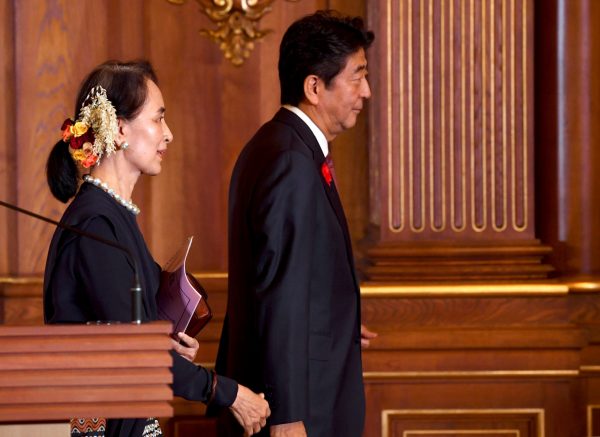Japan’s public–private assistance for financial development in Myanmar emerged in a Financial Services Agency (FSA) working group specialising in ‘international expansion’ in 2012. The working group proposed a collection of policy suggestions such as offering technical assistance for financial development and support for financial deregulation in Asia to promote the internationalisation of business activities by Japanese firms and financial institutions.
Reflecting on these policy suggestions, the Japanese cabinet approved Japan’s Revitalization Strategy in 2013, where it articulated that ‘by taking in the growth of Asia, the government will vitalise stock markets and improve asset management markets to build a No. 1 financial/capital market in Asia’. In 2014, the revised growth strategy further pledged that ‘the government will also support Japanese firms’ and financial institutions’ activities in Asia’.
In recent years, Southeast Asia has become a key foreign direct investment (FDI) destination for Japanese firms, partly because of rising labour costs in China. Since 2013, the ASEAN–4 nations — Indonesia, Malaysia, the Philippines and Thailand — have attracted more FDI from Japan than China.
Japanese financial institutions, particularly banks, are also shifting their weight towards Southeast Asia. Japanese bank claims on Asia have grown 105 per cent since the end of 2008, as Japanese banks expand their client base from Japanese firms to local entities and even individual customers overseas. The IMF predicts that this expansionary trend is likely to continue over the medium term.
There is new empirical evidence that banking FDI precedes and promotes manufacturing FDI. Indeed, coupled with the overseas re-expansion of Japanese banks, Japanese companies are eager to hold stakes in local companies or even proceed with mergers and acquisitions. This will enable them to enhance their market shares in Southeast Asian economies.
Seen from this angle, Japan’s involvement in financial reforms in Myanmar are a means to facilitate its industrialisation. In 2015, for example, the Japan–Myanmar joint venture opened the Thilawa Special Economic Zone (SEZ), the first of its kind in Myanmar.
In the ASEAN region, Myanmar has the fifth largest population after the ASEAN–4, but a GDP per capita only higher than Laos and Cambodia. This alone makes the country one of the most important destinations for further Japanese investments.
In January 2014, the FSA and Myanmar’s Ministry of Finance signed an MOU to cooperate on securities, insurance and microfinance — officially marking the commencement of Japan’s public–private engagement in financial development in Myanmar. That year, 25 banks from 12 countries in the Asia Pacific applied for operating licenses in Myanmar. Myanmar gave permission to nine foreign banks to open branches. While many countries obtained only one license, all three Japanese mega-banks received licenses.
Currently, foreign banks are only allowed to operate for foreign entities. Among other business opportunities, Japanese banks can lend to Japanese firms to open factories in the Thilawa SEZ, where exemptions to financial sector regulations are granted.
In December 2015, two Japanese firms also helped Myanmar establish the Yangon Stock Exchange (YSX). First Myanmar Investment, Myanmar Thilawa SEZ Holdings and Myanmar Citizens Bank became the first listed companies in 2016.
In 2018, the ‘Japan coalition’, comprising the FSA, Japanese investment bank Daiwa and the Japan Exchange Group (JPX), articulated that it had ‘seamless and steady’ support for the development of Myanmar’s capital market. But facing sluggish public listings and sliding stock prices, the Japanese side formulated a comprehensive revitalisation package for the YSX, pledging to hold more seminars across Myanmar and accept Myanmar officials into Japanese financial organisations.
For the JPX, it was apparently more about accumulating experience than making profits. JPX’s and other Japanese private and public involvements are clearly strategically based on a belief in the long-term potential of Myanmar and the region. The listing of Japanese stocks in the YSX as well as the listing of Myanmar stocks in the JPX might become attractive propositions in the future.
While there is generally a positive correlation between financial development and economic growth, scholars remain inconclusive about the direction of causality. There is evidence that the significance of the securities market relative to the banking sector grows as an economy develops. But the contribution of financial development to GDP per capita seems limited in Southeast Asia. Looking closer, the financial markets are dominated by a few large companies while the secondary markets remain relatively illiquid and law enforcement weak.
Myanmar’s challenge is multi-fold. For broader cash flow-based lending, accounting procedures and credit practices must be modernised and financial inclusion enhanced. The gradual liberalisation of the banking sector for foreign banks is a legitimate first step towards reform, but the process is still in its infancy.
At the same time, corporate governance and law enforcement must be strengthened to nurture institutional investors and make the finances of large corporate groups more transparent. The opening of the stock market is part of this effort.
But most importantly, Japan’s experience suggests that strong linkages between financial and industrial policies are key. In this sense, Myanmar is an ideal testing ground for Japan to be part of a country’s development beyond providing foreign aid and promoting its own export industry.
Tomoo Kikuchi is Visiting Senior Fellow at the S. Rajaratnam School of International Studies (RSIS), Nanyang Technological University (NTU), Singapore.
Takehiro Masutomo is a PhD candidate at the National Graduate Institute for Policy Studies (GRIPS), Tokyo and a freelance journalist focussing on the economics and politics of East Asia.
A version of this article was originally published here on RSIS.

